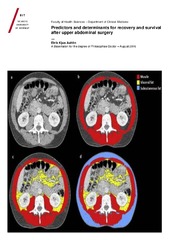Predictors and determinants for recovery and survival after upper abdominal surgery
Permanent link
https://hdl.handle.net/10037/9837View/
Thesis (PDF)
Paper I: Aahlin, E. K., Meyenfeldt, M., Dejong, C. H. C., Ljungqvist, O., Fearon, K. C., Lobo, D. N., Demartines, N., Revhaug, A., Wigmore, S. J., Lassen, K.: “Functional recovery is considered the most important target: a survey of dedicated professionals”. Also available in Perioperative Medicine 2014, 3:5. (PDF)
Paper II: Hughes, M., Coolsen, M. M. E., Aahlin, E. K., Harrison, E. M., McNally, S. J., Dejong, C. H. C., Lassen, K., Wigmore, S. J.: “Attitudes of patients and care providers for enhanced recovery after surgery programs after major abdominal surgery”. Also available in Journal of Surgical Research 2015, 193(4):102-110. (PDF)
Paper III: Aahlin, E. K., Tranø, G., Johns, N., Horn, A., Søreide, J. A., Fearon, K. C., Revhaug, A., Lassen, K.: “Risk factors, complications and survival after upper abdominal surgery: a prospective cohort study”. Also available in BMC Surgery 2015, 15(83). (PDF)
Paper IV: Aahlin, E. K., Tranø, G., Johns, N., Horn, A., Søreide, J. A., Fearon, K. C., Revhaug, A., Lassen, K.: “Health-related quality of life, cachexia and overall survival after major upper abdominal surgery: a prospective cohort study”. (Postprint). Also available in Scandinavian Journal of Surgery 2016, April 25. (PDF)
Paper V: Aahlin, E. K., Irino, T., Johns, N., Brismar, T. B., Nilsson, M., Revhaug, A., Lassen, K.: “Body composition indices and tissue loss in patients with resectable gastric adenocarcinoma”. (Submitted manuscript version). Published version available in JSCM Clinical Reports 2017, 2(1). (PDF)
Paper VI: Aahlin, E. K., Olsen, F., Uleberg, B., Jacobsen, B. K., Lassen, K.: “Major postoperative complications are associated with impaired long-term survival after gastro-esophageal and pancreatic cancer surgery: a complete national cohort study”. Also available in BMC Surgery 2016, 7. (PDF)
Date
2016-10-21Type
Doctoral thesisDoktorgradsavhandling
Author
Aahlin, Eirik KjusAbstract
Background: Patients with colorectal malignancies have benefited from major improvements in surgical technique and perioperative care during the last decades. These improvements have contributed to fast recovery and high survival rates. In contrast, patients with upper abdominal malignant disease often experience delayed recovery and long-standing functional impairment. Postoperative complications are frequent and the prognosis is often poor. Only a small fraction of patients will survive for five years or more after surgery. Delayed recovery, postoperative morbidity and poor prognosis will naturally affect patients’ health-related quality of life (HRQOL). Patients with upper abdominal malignancies are often weakened by cachexia and sarcopenia (low relative amount of skeletal muscle tissue) preoperatively. Aim - To explore predictors and determinants for recovery and survival after upper abdominal surgery. - To explore how patients and dedicated professionals define recovery. - To explore new and old indicators of risk and prognosis with emphasis on methods to assess cachexia and sarcopenia. - To explore correlations between postoperative morbidity, HRQOL and overall survival after major upper abdominal surgery. Results and conclusions Recovery of mobility and GI function are considered the most important target of convalescence after surgery. The traditional global indicators of poor prognosis after surgery, preoperative weight loss and abnormal serum-albumin, are still valid today. There is a close correlation between functional impairment and prognosis after major upper abdominal surgery. Tissue loss during surgical and oncological treatment for upper abdominal cancer can be evaluated through routine CT examinations. Preoperative low muscularity is independently associated with poor prognosis after resection for gastric adenocarcinoma. However, preoperative body composition indices do not seem to be global indicators of poor prognosis as importance and cut-offs seem to vary with different diseases. Postoperative morbidity is associated with poor long-term survival after major upper abdominal cancer surgery.
Publisher
UiT The Arctic University of NorwayUiT Norges arktiske universitet
Metadata
Show full item recordCollections
Copyright 2016 The Author(s)
The following license file are associated with this item:


 English
English norsk
norsk
